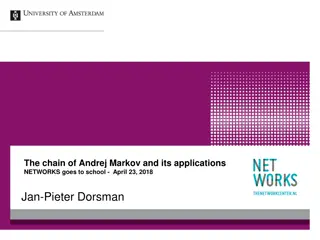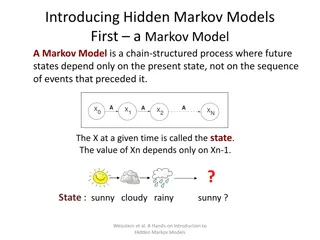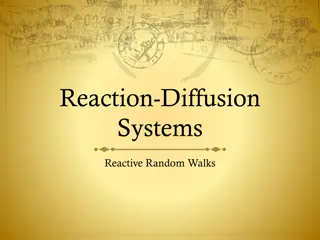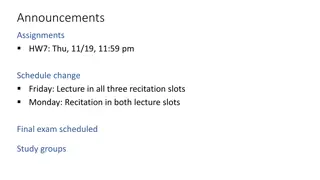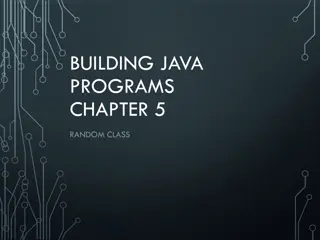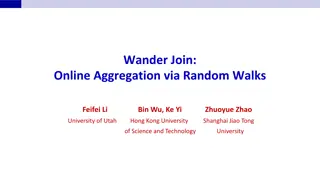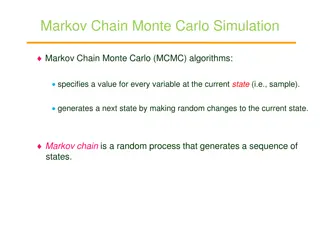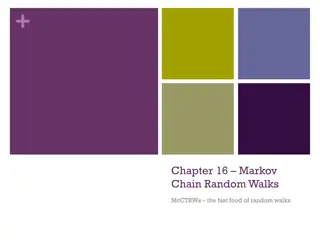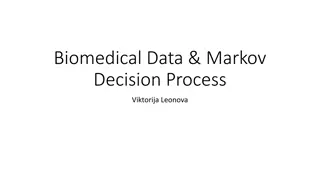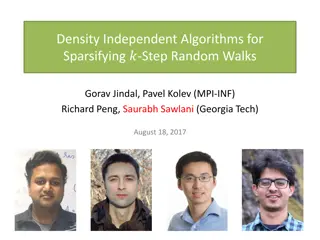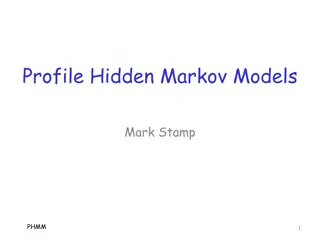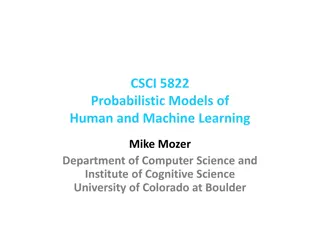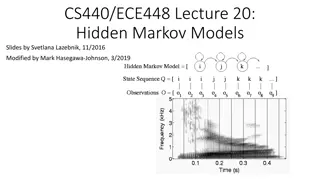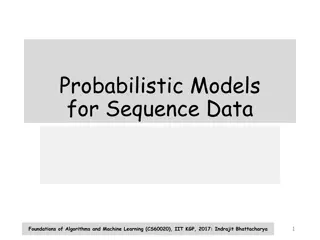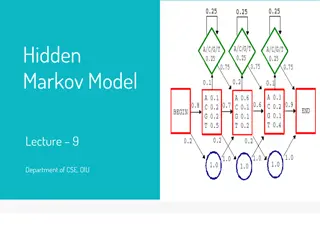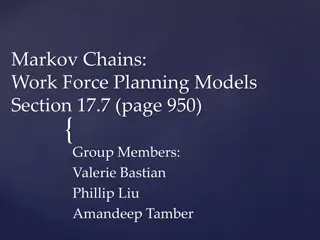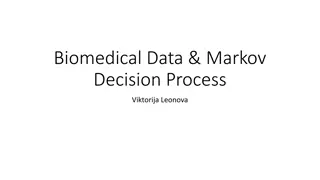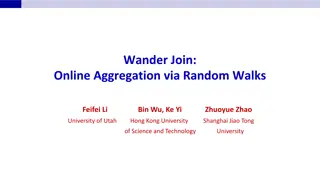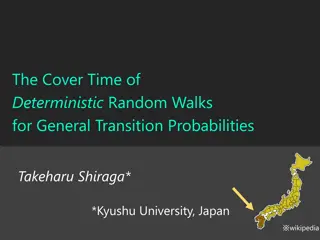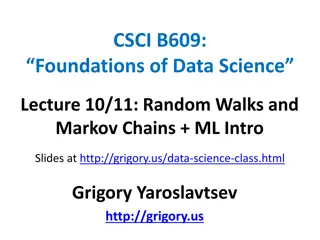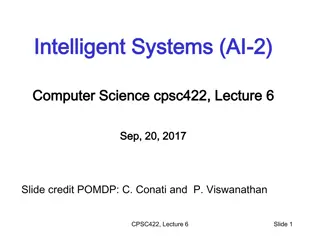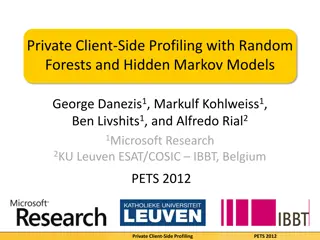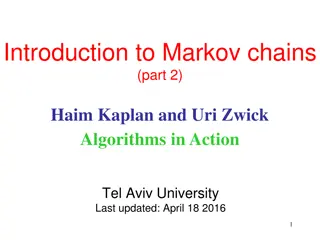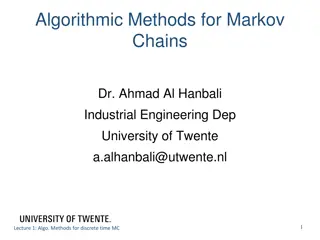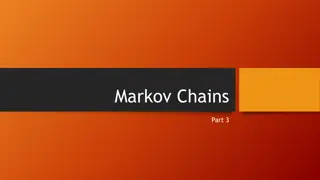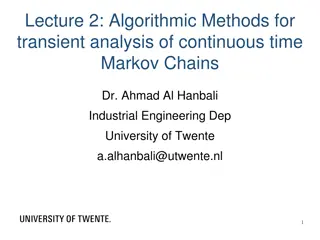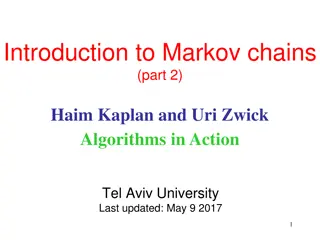Polymer Degradation Processes in Chemistry
Polymer degradation involves a reduction in molecular weight due to various factors like heating, mechanical stresses, radiation, oxygen, and moisture. Two main types of degradation include chain end degradation and random degradation, each affecting the polymer structure differently. Chain end degr
3 views • 12 slides
Markov Chains and Their Applications in Networks
Andrej Markov and his contributions to the development of Markov chains are explored, highlighting the principles, algorithms, and rules associated with these probabilistic models. The concept of a Markov chain, where transitions between states depend only on the current state, is explained using we
20 views • 21 slides
Introduction to Markov Models and Hidden Markov Models
A Markov model is a chain-structured process where future states depend only on the present state. Hidden Markov Models are Markov chains where the state is only partially observable. Explore state transition and emission probabilities in various scenarios such as weather forecasting and genetic seq
2 views • 12 slides
Reaction-Diffusion Systems and Random Walks in Chemistry
Delve into the fascinating world of reaction-diffusion systems and random walks in chemistry, exploring concepts such as well-mixed reactive systems, diffusion-reaction dynamics, finite differences, and incorporating reactions into random walks. Discover how these principles play a crucial role in u
1 views • 29 slides
Introduction to Markov Decision Processes and Optimal Policies
Explore the world of Markov Decision Processes (MDPs) and optimal policies in Machine Learning. Uncover the concepts of states, actions, transition functions, rewards, and policies. Learn about the significance of Markov property in MDPs, Andrey Markov's contribution, and how to find optimal policie
1 views • 59 slides
Random Class in Java Programming
The Random class in Java is used to generate pseudo-random numbers. By utilizing methods such as nextInt and nextDouble, you can generate random integers and real numbers within specified ranges. This chapter explores common usage scenarios, such as generating random numbers between specific ranges
2 views • 10 slides
Wander Join: Online Aggregation via Random Walks in Database Workloads
Wander Join is a technique for online aggregation using random walks, addressing challenges in efficiency and correctness in both transactional and analytical database workloads. It allows for complex analytical queries such as TPC-H queries and provides insights into revenue loss due to returned or
0 views • 27 slides
MCMC Algorithms and Gibbs Sampling in Markov Chain Monte Carlo Simulations
Markov Chain Monte Carlo (MCMC) algorithms play a crucial role in generating sequences of states for various applications. One popular MCMC method, Gibbs Sampling, is particularly useful for Bayesian networks, allowing the random sampling of variables based on probability distributions. This process
1 views • 7 slides
Markov Chains and Applications
Markov chains are models used to describe the transition between states in a process, where the future state depends only on the current state. The concept was pioneered by Russian mathematician Andrey Markov and has applications in various fields such as weather forecasting, finance, and biology. T
2 views • 17 slides
Markov Chain Random Walks in McCTRWs
Delve into the realm of Markov Chain Random Walks and McCTRWs, a method invented by a postdoc in Spain, which has shown robustness in various scenarios. Discover the premise of random walk models, the concept of IID, and its importance, along with classical problems that can be analyzed using CTRW i
1 views • 48 slides
Biomedical Data and Markov Decision Processes
Explore the relationship between Biomedical Data and Markov Decision Processes through the analysis of genetic regulation, regulatory motifs, and the application of Hidden Markov Models (HMM) in complex computational tasks. Learn about the environment definition, Markov property, and Markov Decision
0 views • 24 slides
Density Independent Algorithms for Sparsifying Random Walks
This presentation discusses density-independent algorithms for sparsifying ?-step random walks on graphs, focusing on sparsification by resistances and spectral sparsification. The talk outlines definitions, applications, and results related to the topic. Random walk graphs, transition matrices, Lap
0 views • 20 slides
Hidden Markov Models: Understanding State Transition Probabilities
Hidden Markov Models (HMM) are powerful tools used to model systems where states are not directly observable but can be inferred from behaviors. With a focus on state transition probabilities, HMM allows for the estimation of current states based on previous observations. This concept is illustrated
0 views • 17 slides
Profile Hidden Markov Models
Hidden Markov Models (HMMs) and Profile Hidden Markov Models (PHMMs) are powerful machine learning techniques used in various fields such as speech analysis, music search engines, malware detection, and intrusion detection systems. While HMMs have limitations regarding positional information and mem
1 views • 49 slides
CSCI 5822 Probabilistic Models of Human and Machine Learning
This content delves into probabilistic models of human and machine learning, covering topics such as Hidden Markov Models, Room Wandering, Observations, and The Occasionally Corrupt Casino. It explores how observations over time impact hidden unobserved states, formalizing problems, and understandin
0 views • 28 slides
Introduction to Hidden Markov Models
Hidden Markov Models (HMM) are a key concept in the field of Natural Language Processing (NLP), particularly in modeling sequences of random variables that are not independent, such as weather reports or stock market numbers. This technology involves understanding properties like limited horizon, ti
0 views • 33 slides
Probabilistic Environments: Time Evolution & Hidden Markov Models
In this lecture, we delve into probabilistic environments that evolve over time, exploring Hidden Markov Models (HMMs). HMMs consist of unobservable states and observable evidence variables at each time slice, following Markov assumptions for state transitions and observations. The lecture covers tr
0 views • 28 slides
Probabilistic Models for Sequence Data: Foundations of Algorithms and Machine Learning
This content covers topics such as Markov models, state transition matrices, Maximum Likelihood Estimation for Markov Chains, and Hidden Markov Models. It explains the concepts with examples and visuals, focusing on applications in various fields like NLP, weather forecasting, and stock market analy
0 views • 25 slides
Hidden Markov Model and Markov Chain Patterns
In this lecture, the Department of CSE at DIU delves into the intricate concepts of Hidden Markov Models and Markov Chains. Exploring topics such as Markov Chain Model notation, probability calculations, CpG Islands, and algorithms like Forward and Viterbi, this comprehensive guide equips learners w
0 views • 24 slides
Randomized Algorithms and Independence Concepts
Types of independence in randomized algorithms are explored alongside the concept of random bit complexity and generation. The idea of mutually independent random variables versus pairwise independent random variables is discussed, illustrating how to generate uniformly random and pairwise independe
1 views • 18 slides
Random Number and Variate Generation Overview
Random numbers play a crucial role in modern computing, aiding in cryptography, simulation, and system testing. This overview delves into the properties of random numbers, the generation of pseudo-random numbers, techniques for generating them, and tests for their validity. It explores the significa
0 views • 59 slides
Overview of Sampling Methods in Markov Chain Monte Carlo
This content covers various sampling methods in Markov Chain Monte Carlo including Rejection Sampling, Importance Sampling, and MCMC Sampling. It delves into representing distributions, drawbacks of Importance Sampling, and the motivation behind Markov Chain Monte Carlo Sampling. The illustrations p
0 views • 25 slides
Markov Chains: Workforce Planning Models Section 17.7
Delve into the intricate world of Markov Chains through the lens of workforce planning models in Section 17.7. Understand the dynamics of designing efficient workforce strategies with insights from group members Valerie Bastian, Phillip Liu, and Amandeep Tamber. Explore the applications of Markov Ch
0 views • 38 slides
Understanding Markov Decision Processes in Biomedical Data Analysis
Explore the application of Markov Decision Processes in analyzing biomedical data, focusing on gene regulation, regulatory motifs, and computational modeling techniques. Learn about the key concepts such as the definition of the environment, Markov property, and Markov environments in the context of
0 views • 24 slides
Electric Networks and Random Walk Interconnection
Explore the intriguing relationship between random walks on graphs and electric networks. Discover how concepts from electric networks can enhance the mathematical theory of random walks, leading to surprising connections between these seemingly unrelated fields.
0 views • 40 slides
Online Aggregation via Random Walks and Complex Analytical Queries
Explore the concepts of online aggregation via random walks for database workloads and complex analytical queries like TPC-H. Understand efficient and correct processing in transactional and analytical scenarios. Dive into examples like Ripple Join and its application in handling sparse joins.
0 views • 27 slides
Random Walks with Tabu Lists in Routing Algorithms
Discover the innovative use of random walks with tabu lists in routing algorithms for wireless sensor networks. Explore the benefits, comparisons, and implications of this approach, presented in a synchronized meeting on 22/02/11.
1 views • 35 slides
Understanding Random Walks and Absorbing Nodes in Data Mining
Explore the concepts of random walks on graphs, stationary distribution, random walks with restarts, and absorbing random walks in data mining. Discover how these methods influence probability distributions and graph traversal, with a focus on the impact of absorbing nodes. Strengthen your knowledge
0 views • 59 slides
Wi-Fi Protected Setup Brute-Force Mitigation Using Markov Chains Progress
Explore how Wi-Fi Protected Setup (WPS) technology can be secured against brute-force attacks through the use of Markov Chains. The progress includes defining variables, states for Markov chains, and probabilities to model different wireless router mechanisms for mitigating attacks.
0 views • 5 slides
Understanding Tail Bounds and Markov's Inequality
Tail bounds and Markov's Inequality are crucial concepts in probability theory and statistics. Tail bounds help us approximate probabilities in the tails of distributions, while Markov's Inequality provides a bound on the probability that a non-negative random variable exceeds a certain value. Learn
0 views • 25 slides
Deterministic Random Walks for Network Exploration and Cover Time Analysis
Explore the concept of deterministic random walks in network exploration. Understand the cover time and its significance in traversing graphs efficiently. Discover the simplicity and robustness of random walks in navigating through connected graphs.
0 views • 58 slides
Random Walks and Markov Chains in Data Science Lecture
Explore the concepts of random walks, Markov chains, gradient descent, and stationary distribution in data science. Gain insights into their applications and implications for data analysis and machine learning. Delve into strong connections and terminal components within graphs, understanding the ma
0 views • 19 slides
Understanding Partially Observable Markov Decision Processes (POMDPs)
Explore the concept of Belief State Update Policies and Optimal Policy in Partially Observable Markov Decision Processes (POMDPs). Learn about Markov Models, Hidden Markov Models, and how to update belief states with examples. Dive deeper into the world of intelligent systems and AI in computer scie
0 views • 24 slides
Private Client-Side Profiling with Random Forests and Hidden Markov Models
Explore the concept of private client-side profiling using random forests and hidden Markov models for classification tasks. Learn about the advantages of privacy and correctness guaranteed by proof in this innovative approach. Discover applications in behavioral advertising, P2P dating, financial l
0 views • 25 slides
Understanding Markov Chains: Properties and Applications
Explore the concept of Markov chains through discussions on reversible and symmetric chains, along with practical applications like sampling from large spaces. Learn about stationary distributions, random walks on graphs, and more in this informative guide.
0 views • 51 slides
Algorithmic Methods for Markov Chains in Industrial Engineering Lectures
Explore numerical solutions for equilibrium equations, transient analysis, M/M/1-type models, G/M/1 and M/G/1-type models, and finite Quasi Birth Death processes in Algorithmic Methods for Markov Chains. Learn about stationary Markov chains, irreducibility, absorbing Markov chains, and more.
0 views • 27 slides
Introduction to Hidden Markov Models and Machine Learning
Understand the basics of Hidden Markov Models, Markov Processes, and Probabilistic Calculations in the context of Pattern Recognition and Machine Learning. Explore fundamental concepts and example calculations related to transition probabilities and state sequences.
0 views • 11 slides
Understanding Absorbing and Transient States in Markov Chains
Learn about absorbing and transient states in Markov Chains with examples and sample problems. Understand the concept of canonical form and how to analyze probabilities and absorption in a Markov Chain system.
0 views • 17 slides
Algorithmic Methods for Transient Analysis of Continuous Time Markov Chains
Explore the transient analysis of continuous time Markov chains, including finding equilibrium distributions, transient probabilities, matrix decomposition, and transient measures. Learn about the homogeneous, stationary, and irreducible properties of Markov chains. Discover how to derive the genera
0 views • 18 slides
Advanced Topics in Markov Chains and Their Applications
Explore advanced concepts in Markov chains such as mixing time, reversible Markov chains, symmetric Markov chains, and examples of random walks on graphs. Learn about reversible distributions, stationary distributions, and the properties of different types of Markov chains.
0 views • 55 slides

